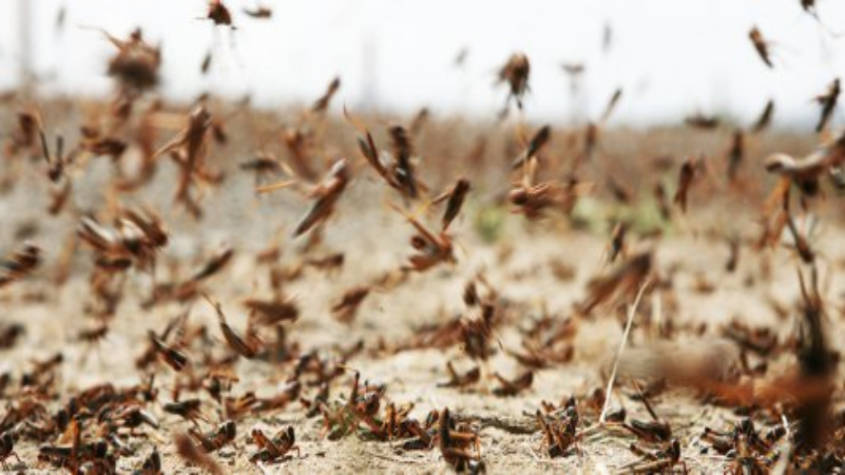China extends full support to Pakistan in fight against locust plague
China’s support to Pakistan in difficult times is a testimony of the two countries’ true friendship that is rooted in the hearts of their people. The friendship and cooperation have further strengthened amid global crisis. Pakistan extended moral and materialistic support to China in fight against COVD-19. China has reciprocated support to Pakistan to combat the pandemic and locust plague in country. Chinese Embassy representative in Pakistan Gu Wenliang has underlined that China is grateful for Pakistan’s support and obliged to reciprocate with the same intensity to combat locust and pandemic crisis in Pakistan. Meanwhile, governor Punjab Chaudhry Muhammad Sarwar appreciated China’s timely and valuable support to address the issue of locust plague in Pakistan.
So far, China has donated 300 tons of locust control pesticides and 350 vehicle-mounted sprayers to Pakistan. In addition to that, Chinese experts in locus control have also visited Pakistan to help it fight the plague.
KARACHI: Pakistan and China have further strengthened their friendly relationship during the global crisis.
Earlier, Islamabad extended assistance to Beijing in the fight against coronavirus late last year and now the latter is helping the former in the war against locust swarm attacks on the standing wheat crop.
“Pakistan provided assistance to China after the Covid-19 outbreak (in Wuhan late in December 2019)…China and its people hold to return to Pakistani brothers,” said Chinese Embassy representative in Pakistan Gu Wenliang on Wednesday.
He was speaking at the China-Pakistan Trade Hotline Cloud Salon on the theme of “Joint Efforts for Locust Control”, organised online by the China Economic Net – the only financial media among China’s key news websites.
The Express Tribune also provided strong support for the salon information and introduction in Pakistan.
“Pakistan is experiencing the worst locust plague, which has damaged major crops, including cotton, wheat and corn (worth over Rs200 billion),” Punjab Governor Chaudhry Muhammad Sarwar said in the webinar.
However, the federal and provincial governments are now well equipped to win the war against the second wave of insect attack in the country.
“We could not have done it without your (China and its people) support. China has provided timely support to fight the plague,” he said.
Climate change may have played the role in nourishing the insects. “Prime Minister Imran Khan has declared (locust) emergency in the country,” he added. The webinar was organised ahead of the 69th anniversary of the establishment of diplomatic relations between China and Pakistan on May 21 this year.
Meanwhile, Pakistan is suffering from its worst desert locust infestation in 27 years.
Amid the Covid-19 pandemic, President Arif Alvi and Chinese President Xi Jinping witnessed the signing of a memorandum of understanding (MoU) on strengthening plant disease and insect pest control in Beijing.
China has donated 300 tons of locust control pesticides and 350 vehicle-mounted sprayers in three batches since March. Besides, a team of Chinese experts in locust control also visited Pakistan in recent weeks.
Pakistan’s minister for national food security and research also expressed hope for cooperation between the two countries in the fields of monitoring and warning, as well as youth training, and called on Chinese chemical enterprises to invest in Pakistan.
Pakistan’s Embassy Commercial Counsellor in Beijing Badaruz Zaman said China had provided huge assistance to Pakistan to help it fight the plague.
Besides, the Department for International Development (DFID) of the UK has provided £6 million and the United Nations’ (UN) Food and Agriculture Organisation (FAO) has given $1 million to Pakistan for combating the locust attack on standing crops.
“Some 5,000 personnel are involved in anti-locust operation in Pakistan. We look forward to awareness, technical assistance and training of locals from China,” he said.
The FAO has warned Pakistan about locust invasion in the country. “In Pakistan, 38% of the area (60% in Balochistan, 25% in Sindh and 15% in Punjab) are breeding grounds for the desert locust, whereas the entire country is under the threat of invasion if the desert locust is not contained in the breeding regions,” it said in a report the other day.
There are two types of locusts – the one that comes from local breeding and others migrate from neighbouring countries, including Iran, India and the African continent. Asia and Africa were the two continents whose food security was at risk due to the locust attack, the speakers said. Entomology Professor at CAU and locust control expert at FAO Zhang Long said Pakistan was making serious efforts to control locusts. However, it was short of resources to win the war.
He advised that bio-chemicals should be used instead of chemical pesticides. “The use of pesticides pollutes the environment and crops. Farmers should take precautionary measures before spraying the pesticides like wearing the face mask and gloves,” he said. “The best time to spray pesticides is morning,” he said.
The speakers said Pakistan was fighting on at least three fronts – locust, coronavirus and hunger.
Food security is at risk. Farmers have expressed inability to control the locust. The federal and provincial governments, in collaboration with international assistance and all locust-infested countries in Asia and Africa, should get united in the fight against the insects.
Pakistan fully supports China’s One Belt, One Road initiative: Information Minister
Minister for Information and Broadcasting Attaullah Tarar has reaffirmed government’…












